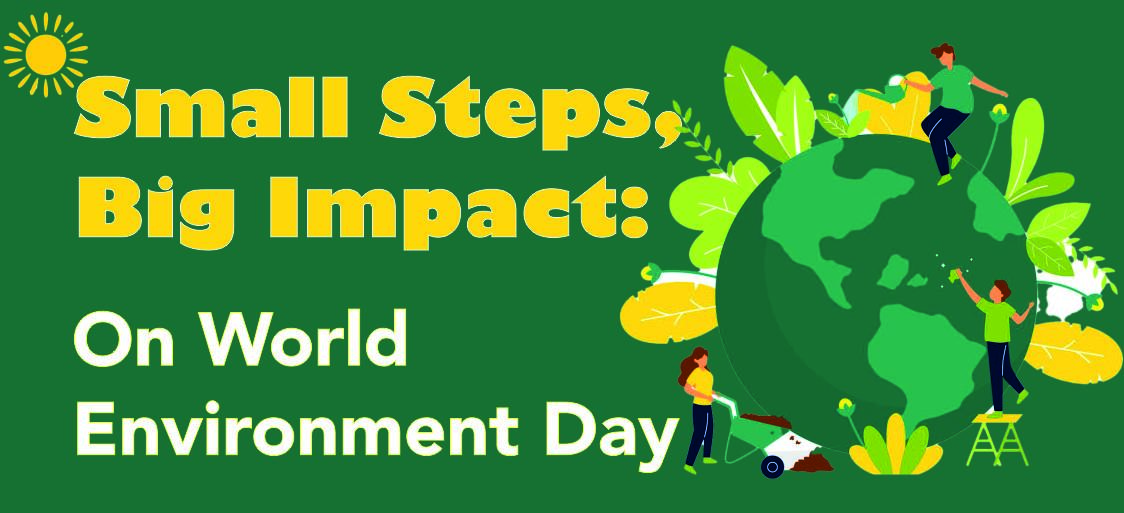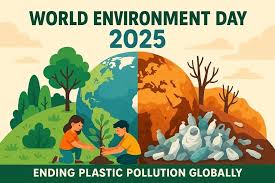Small Steps, Big Impact: How Simple Daily Actions Can Help Save the Environment
In the face of climate change, pollution, and biodiversity loss, the global environmental crisis can seem insurmountable. But scientific research increasingly shows that individual actions, when taken collectively, can generate meaningful environmental benefits. Even modest changes in our daily habits—what we eat, how we travel, how we consume resources—can reduce emissions, conserve natural resources, and help restore balance to the planet.
Cutting Carbon: Energy Efficiency at Home
One of the most effective ways individuals can fight climate change is by reducing household energy consumption. According to the U.S. Department of Energy, lighting accounts for nearly 10% of home electricity use. Simply replacing incandescent bulbs with LED bulbs can reduce energy use by at least 75%, saving up to 100 kilowatt-hours (kWh) per bulb per year. If every household in the U.S. replaced just one bulb, it would prevent 6 million metric tons of carbon dioxide (CO₂) emissions annually—the equivalent of removing over 1.5 million cars from the road.
Other small actions like unplugging electronics, insulating windows, or using a programmable thermostat also contribute significantly. A well-insulated home, for example, can reduce heating and cooling energy needs by up to 20%, decreasing both emissions and utility bills.
Food Choices: Eating Sustainably to Feed the Planet
What we eat has a profound environmental footprint. Agriculture is responsible for about 26% of global greenhouse gas emissions, and livestock production is one of the largest contributors. According to a 2018 study published in Science by Poore and Nemecek, producing 1 kilogram of beef generates 60 kilograms of CO₂ equivalents, while lentils produce less than 1 kilogram.
Adopting a plant-rich diet—even partially—can significantly lower one’s environmental impact. The concept of “Meatless Monday,” for instance, encourages people to skip meat just one day per week. If practiced by everyone in the U.S., this simple act could save 1.4 billion animals annually and reduce emissions equivalent to removing 7.6 million cars from the roads.
Water Conservation: Saving a Vital Resource
Freshwater is becoming increasingly scarce due to overuse, pollution, and climate change. Yet, everyday water-saving habits can make a major difference. Turning off the tap while brushing your teeth can save 8 gallons per person per day. If just half the U.S. population adopted this habit, it would save nearly 600 billion gallons of water annually.
Fixing household leaks, using water-efficient appliances, and collecting rainwater for gardening are other effective measures. In drought-prone regions like California, public awareness campaigns helped households reduce water use by over 20% during the 2012–2016 drought, proving that small changes in behavior can lead to large-scale conservation.
Plastic Waste: A Global Crisis We Can Fight Locally
Plastic pollution is one of the most visible environmental problems. Each year, the world produces over 380 million tons of plastic, and only 9% is recycled. Plastic bags, bottles, and packaging clog waterways, kill marine life, and take hundreds of years to decompose.
Yet individual efforts can make a difference. Using a reusable water bottle prevents the use of about 167 single-use bottles per person per year. Bringing your own shopping bag can eliminate 700 plastic bags annually. If just 10% of the global population switched to reusables, it would keep tens of billions of plastic items out of the environment each year.
Transportation: Walking, Biking, and Public Transit Matter
Transportation accounts for about 14% of global greenhouse gas emissions, most of which come from cars. Replacing even a few short car trips each week with walking, biking, or using public transportation can drastically cut emissions. According to the EPA, short car trips produce more emissions per mile due to cold starts and inefficient operation.
If every American replaced just one 3-mile car trip per week with a walk or bike ride, it would collectively cut over 5 million tons of CO₂ annually. Moreover, cities with bike-friendly infrastructure, like Copenhagen, where 62% of residents commute by bike, have lower air pollution, healthier populations, and more resilient transportation systems.
Composting and Waste Separation: Turning Trash into Treasure
Organic waste accounts for 30–40% of household trash, much of which ends up in landfills where it releases methane, a greenhouse gas 28 times more potent than CO₂. Composting food scraps not only prevents emissions but also creates nutrient-rich soil that can be used in gardens and farms.
Communities that adopt composting see big benefits. In San Francisco, mandatory composting laws helped the city divert over 80% of waste from landfills—the highest rate in the U.S. The compost produced enriches local farms and parks, closing the loop between waste and food.
Behavioral Science: Why Small Habits Lead to Big Change
Research in environmental psychology supports the idea that one small green habit often leads to others. A study in Nature Climate Change found that when people adopt a single sustainable behavior, like recycling, they are more likely to start conserving water, reducing energy use, or advocating for policy change. This is known as positive behavioral spillover.
This effect is magnified in communities. Neighborhoods that promote collective environmental practices—community gardens, recycling programs, or carpooling groups—create a culture of sustainability where small actions become part of everyday life.
Real-World Success: The Case of Kamikatsu, Japan
A powerful example of collective action comes from Kamikatsu, a small town in Japan. Starting in the early 2000s, residents committed to reducing waste without incineration. Today, they separate trash into 45 categories and recycle or reuse over 80% of it, compared to a global average of around 20%. This movement began with simple educational campaigns and a shared goal, proving that grassroots efforts can lead to extraordinary results.
Conclusion: The Planet Is Asking for Your Participation
Scientific evidence is clear: small actions matter. Whether it’s switching off unused lights, biking instead of driving, reducing meat intake, or carrying a reusable bag, your everyday choices ripple outward. Multiply that by millions of people, and the result is powerful enough to shift markets, influence policy, and help heal the planet.
You don’t need to do everything, but you do need to do something. In the words of conservationist Jane Goodall, “What you do makes a difference, and you have to decide what kind of difference you want to make.” With small steps taken consistently, we can all be part of a global movement toward a healthier, more sustainable future.
References:
-
IPCC Special Report on Climate Change (2023)
-
Poore & Nemecek, Science, 2018
-
U.S. Department of Energy (energy.gov)
-
FAO Report on Food Waste (2022)
-
UNEP Plastic Waste Statistics (2023)
-
Nature Climate Change, Vol. 5, 2015









